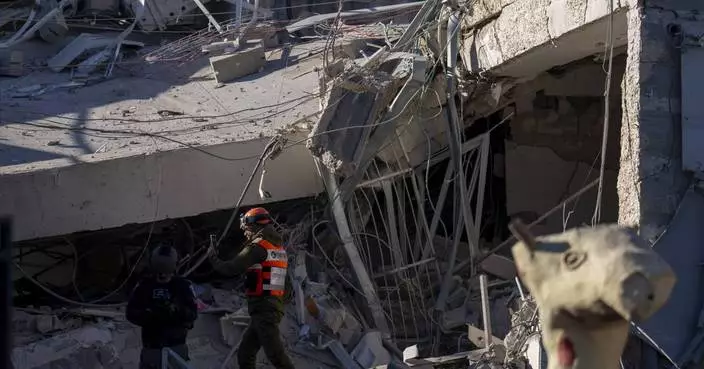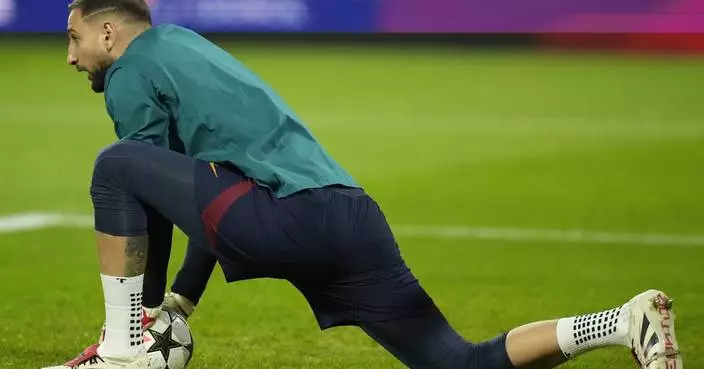BERLIN (AP) — German lawmakers on Thursday approved legislation designed to protect the country's highest court against possible future manipulation or obstruction by authoritarian or extremist politicians.
Officials have cited experiences in Poland, Hungary and elsewhere as illustrating the need to bolster the Federal Constitutional Court. The measure was drawn up by the three parties in the governing coalition that collapsed last month and the mainstream conservative opposition.
In what is expected to be one of its last sessions before it is dissolved ahead of an early election in February, parliament's lower house, or Bundestag, backed the plan by 600 votes to 69.
The legislation is set to anchor the court’s ground rules in the constitution. That means a two-thirds parliamentary majority would be required to change them in the future, rather than a simple majority.
“We see when we look abroad that, when autocrats come to power, they almost always first turn against the effectiveness and independence of justice,” Interior Minister Nancy Faeser told lawmakers.
She named no countries, but backers have pointed to Poland in particular as a cautionary tale. That country’s former nationalist conservative government moved to establish control over the Constitutional Tribunal.
Germany’s Federal Constitutional Court, based in the southwestern city of Karlsruhe, is frequently called on to act as the ultimate arbiter over policy.
It has two panels of eight judges each, who serve a single 12-year term. Those requirements are to be anchored in the constitution, as are the upper age limit of 68 for justices and other rules.
The far-right Alternative for Germany party, which has been polling at up to 20% in recent surveys, argues that mainstream parties are simply trying to cement their own influence over the court.
Half of its justices are elected by the Bundestag and the other half by parliament's upper house, which represents Germany’s 16 state governments. Candidates are proposed by political parties and need a two-thirds majority to be elected, which is meant to ensure balance and effectively rules out highly polarizing figures.
The reform also includes a workaround in the case of “obstructive minorities” blocking the election of justices. That would enable the Bundestag to elect judges if the upper house fails to, or vice versa.

FILE - Andreas Vosskuhle, fourth from right, President of the German constitutional court announced the decision of Germany's highest court to upheld a ban on strikes by civil servants, in Karlsruhe, Germany, Tuesday, June 12, 2018. (AP Photo/Sebastian Gollnow, Pool, File)
MAMOUDZOU, Mayotte (AP) — French President Emmanuel Macron on Thursday surveyed the devastation that a cyclone wrought across the Indian Ocean archipelago of Mayotte as thousands of people tried to cope without the bare essentials and amid fears of a surging death toll.
“Mayotte is demolished,” an airport security agent told Macron as soon as he stepped off the plane.
The security agent, Assane Haloi, said her family members, including small children, are without water or electricity and have nowhere to go, after Cyclone Chido the strongest cyclone in nearly a century ripped through the French territory on Saturday.
“There’s no roof, there’s nothing. No water, no food, no electricity. We can’t even shelter, we are all wet with our children covering ourselves with whatever we have so that we can sleep,” she said, asking for emergency aid.
Macron went on an helicopter for an aerial appraisal of the damage. He then headed to the hospital in Mamoudzou, Mayotte’s capital, to meet with medical staff and patients.
Wearing a traditional Mayotte scarf over his white shirt and tie, sleeves rolled to the elbows, the French president listened to people asking for help. A member of the medical staff told him some people hadn't had a drink of water for 48 hours.
“We can’t help and we are the ones helping,” an employee of the hospital's psychology unit told Macron.
“We are all in an unsafe situation, psychologically unwell, sorry," she said, wiping tears from her eyes while the president put his hand on her shoulder.
Macron said apart from those who arrived with him, more caregivers would be arriving and that a field hospital will be set up on Friday.
Some residents also expressed their agony at not knowing about those who have died or are still missing, partly because of the Muslim practice of burying the dead within 24 hours.
Mayotte’s lawmaker Estelle Youssoufa said “we’re dealing with open-air mass graves. There are no rescuers, no one has come to recover the buried bodies.”
Some survivors and aid groups have described hasty burials and the stench of bodies.
Macron acknowledged that many who died haven't been reported. He said phone services will be repaired “in the coming days” so that people can report their missing loved ones.
French authorities said at least 31 people have died and more than 1,500 people were injured, more than 200 critically. But it’s feared hundreds or even thousands of people have died.
Macron said he would stay in Mayotte overnight and will visit a slum area badly hit by cyclone Chido on Friday morning.
Abdou Houmadou, 27, said it's emergency aid that's needed, not Macron's presence. “Mr President, what I'd like to tell you... is I think the spending you made from Paris to Mayotte would have been better spent to help the people," he said.
Another resident, Ahamadi Mohammed, said Macron’s visit “is a good thing because he’ll be able to see by himself the damage.”
“I think that we’ll then get significant aid to try and get the island back on its feet,” the 58-year-old said.
Macron's office said four tons food and medical aid as well as additional rescuers were aboard the president's flight.
A navy ship arrived in Mayotte on Thursday morning with 180 tons of aid and equipment.
People living in a large slum on the outskirts of Mamoudzou were some of the hardest hit from the cyclone. Many had lost their houses, some had lost friends.
Nassirou Hamidouni sheltered in his house when the cyclone hit.
His neighbor was killed when his house collapsed on him and his six children. Hamidouni and others dug through the rubble to reach them.
The 28-year-old father of five is now trying to rebuild his own house, which was also destroyed.
He believes the death toll is much higher than what’s officially being reported given the severity of what he lived through.
"It was very hard,” he said.
Alibouna Haithouna, a 25-year-old mother of four, said her family has been displaced from the slums and has found shelter in a school.
Her brother was killed by the cyclone, she said, explaining she hasn't been able to get his body from the hospital because of “a lot of paperwork” and the fact that you have to pay to recover the body.
Mayotte, located in the Indian Ocean between mainland Africa’s east coast and northern Madagascar, is France’s poorest territory.
The cyclone devastated entire neighborhoods as many people ignored the warnings, thinking the storm wouldn’t be so extreme.
Mayotte has more than 320,000 people according to the French government.
Most residents are Muslim and French authorities have estimated another 100,000 migrants live there.
Mayotte is the only part of the Comoros archipelago that voted to remain part of France in a 1974 referendum.
The French territory has seen in the past decade a massive arrival of migrants from the neighboring islands — the independent nation of Comoros, one of the world’s poorest countries.
Some other migrants come from as far as Somalia, with, for some, the hope to be able to reach the European continent.
Corbet reported from Paris. Associated Press journalist Masha Macpherson in Paris contributed.
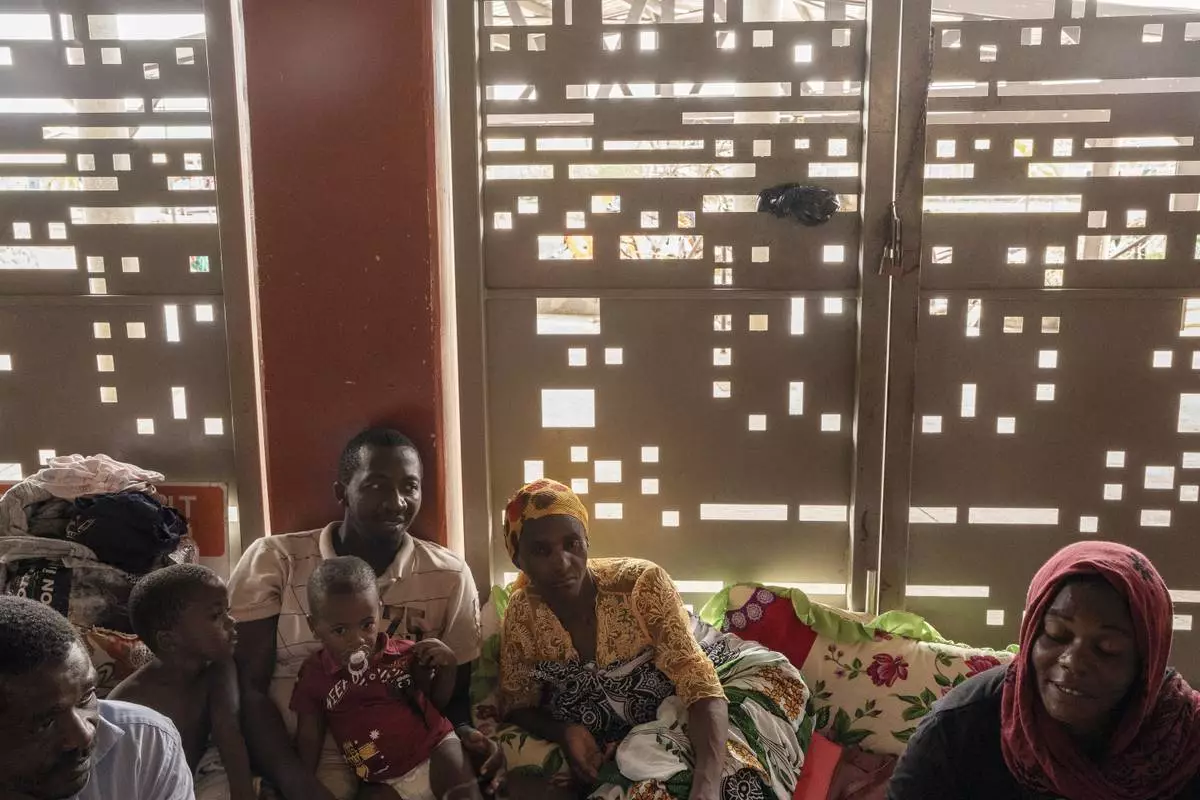
Mohamed Ankidine, 28, third left, with feet injuries, Saindou Dahabou who suffers from diabetes, and Alibouna Haithouna, 33, find refuge at the Lycée des Lumières after losing their homes, in Mamoudzou, Mayotte, Thursday, Dec. 19, 2024. (AP Photo/Adrienne Surprenant)
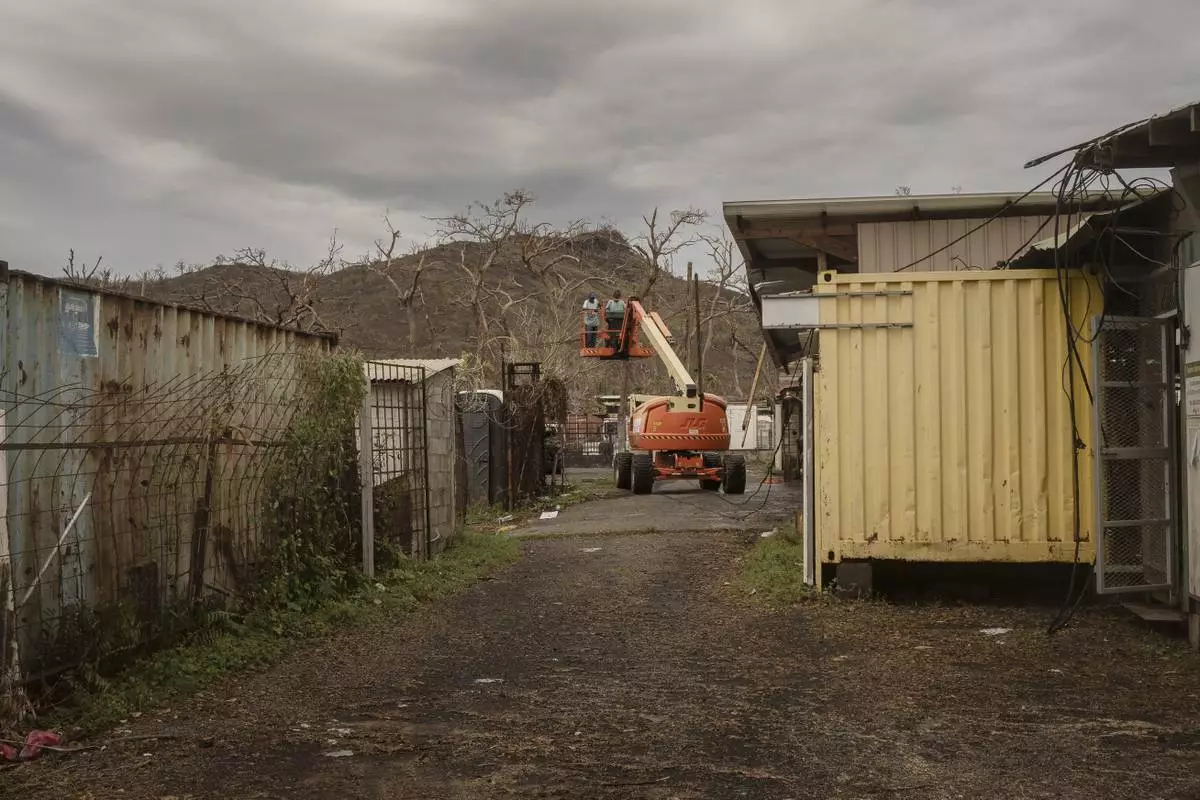
Workers start the process of reconstruction, in Mamoudzou, Mayotte, Thursday, Dec. 19, 2024. (AP Photo/Adrienne Surprenant)
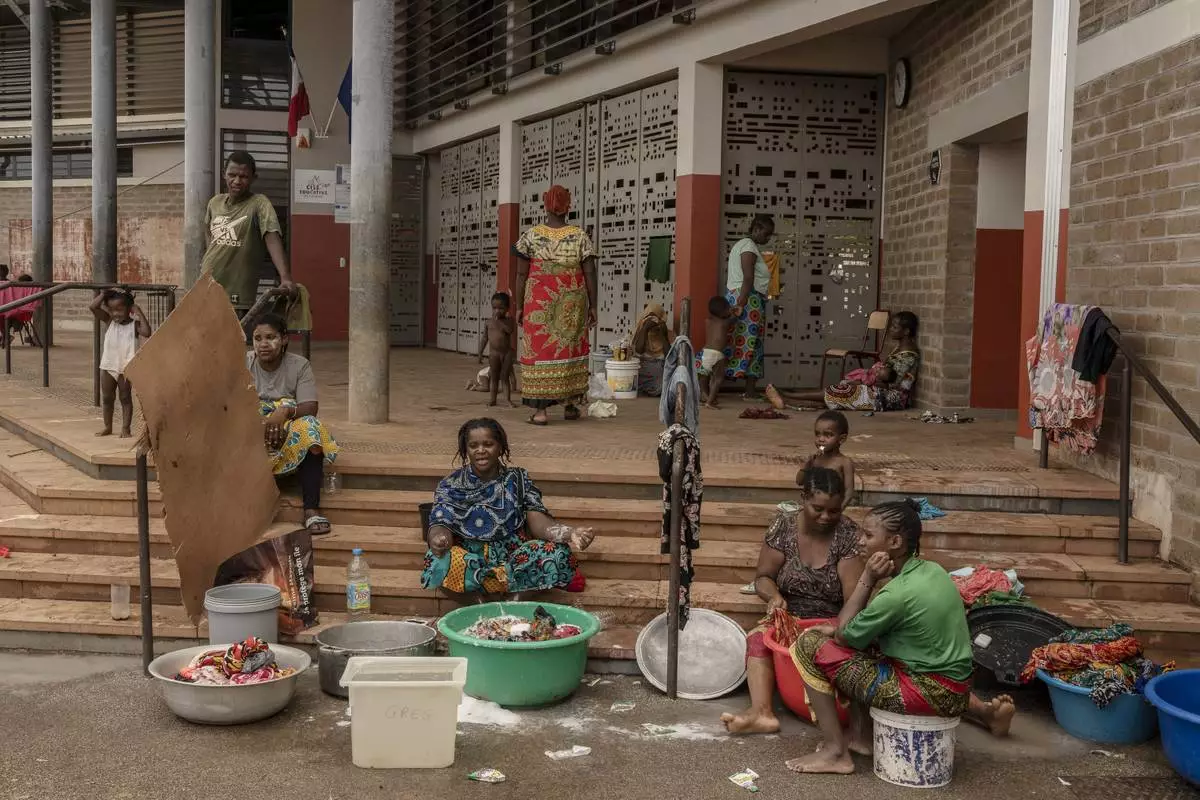
Women wash clothes after a short rain filled their pots with water, at the Lycée des Lumières where they found shelter after losing their homes, in Mamoudzou, Mayotte, Thursday, Dec. 19, 2024 . (AP Photo/Adrienne Surprenant)
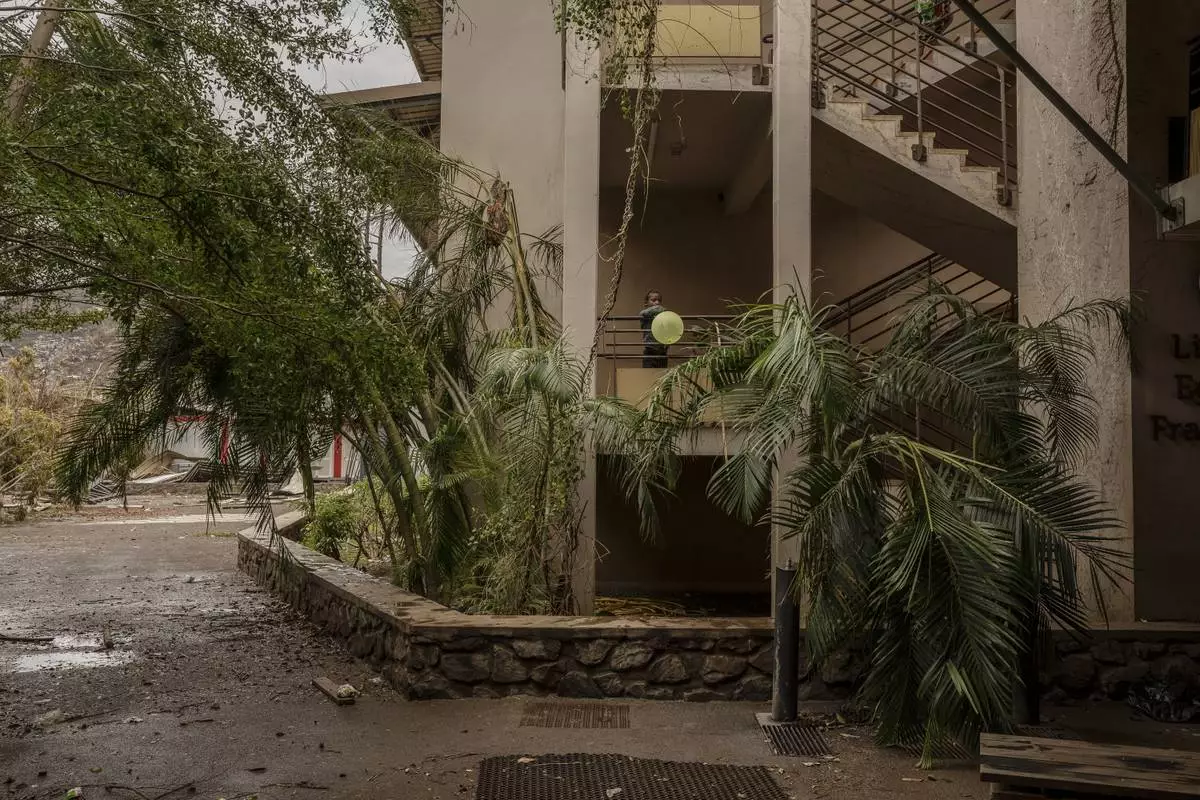
A child plays at the Lycée des Lumières where he found shelter, in Mamoudzou, Mayotte, on Thursday, Dec. 19, 2024. (AP Photo/Adrienne Surprenant)
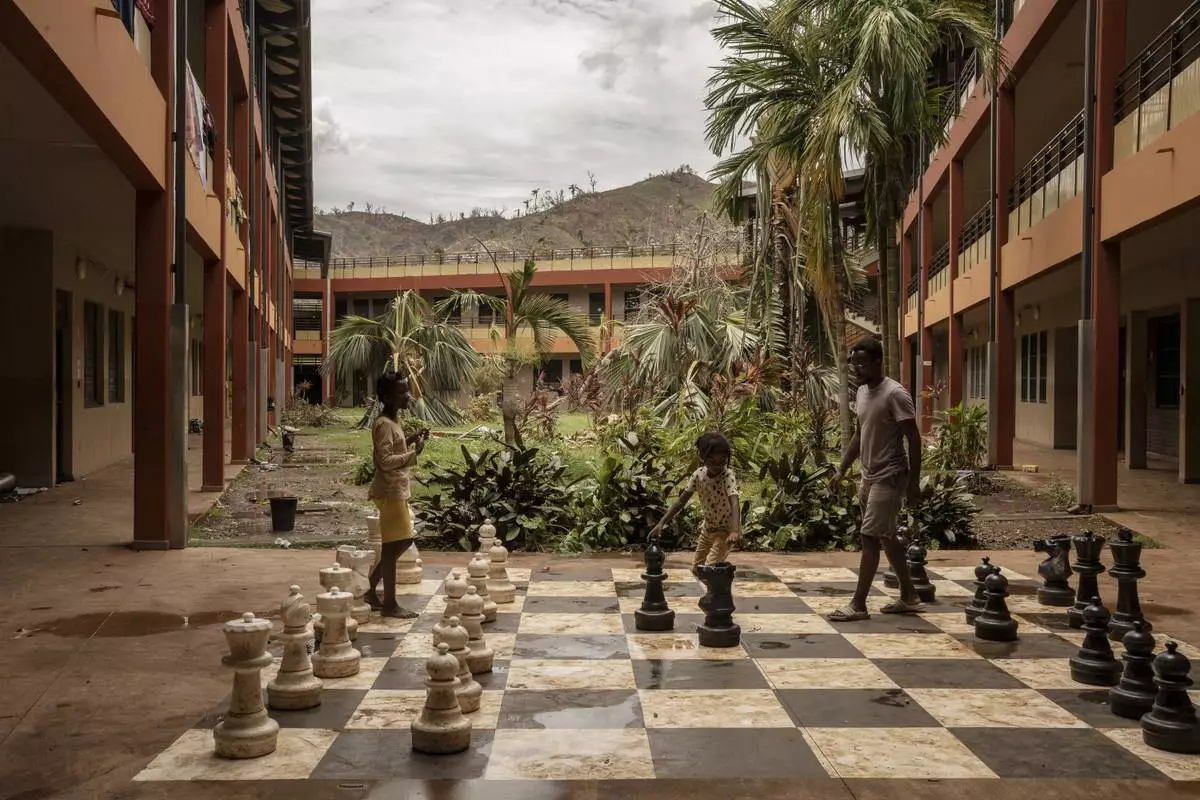
People interact by an outdoor chess board, after finding refuge at the Lycée des Lumières after losing their homes, in Mamoudzou, Mayotte, Thursday, Dec. 19, 2024. (AP Photo/Adrienne Surprenant)
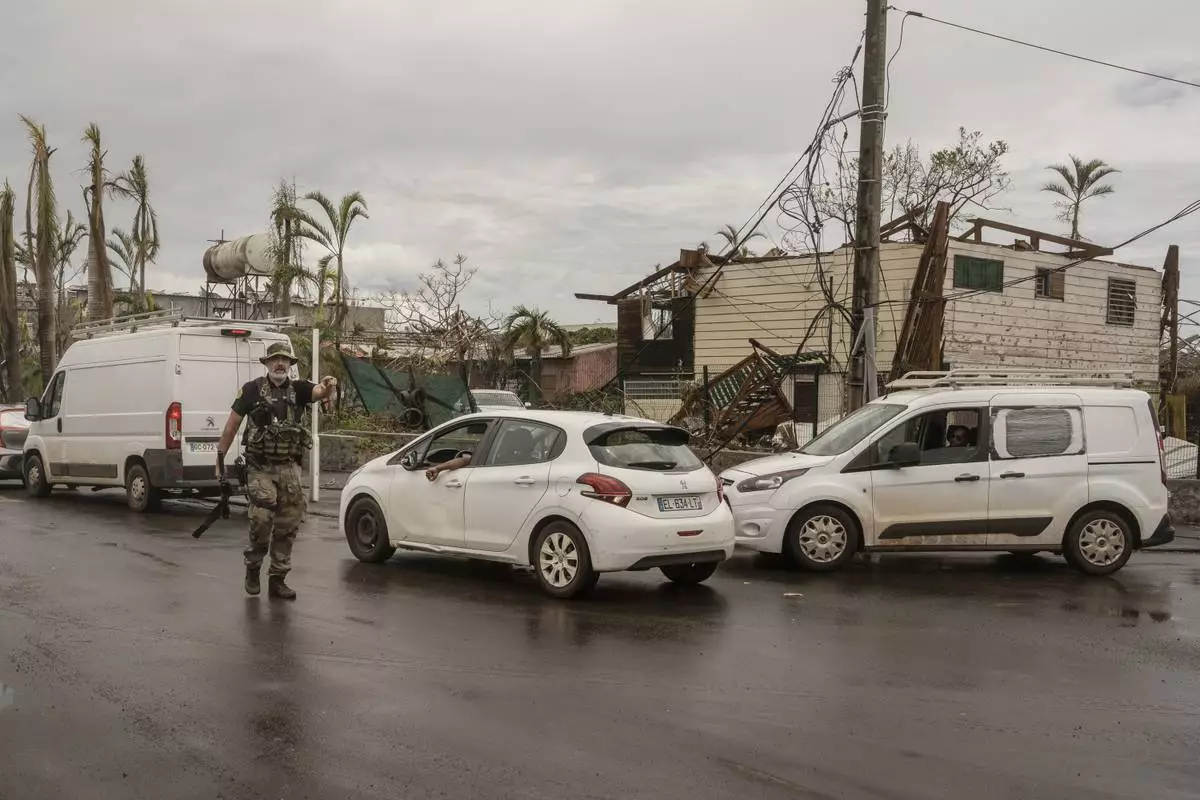
A French officer directs traffic for essential vehicles, in Mamoudzou, Mayotte, Thursday, Dec. 19, 2024. (AP Photo/Adrienne Surprenant)
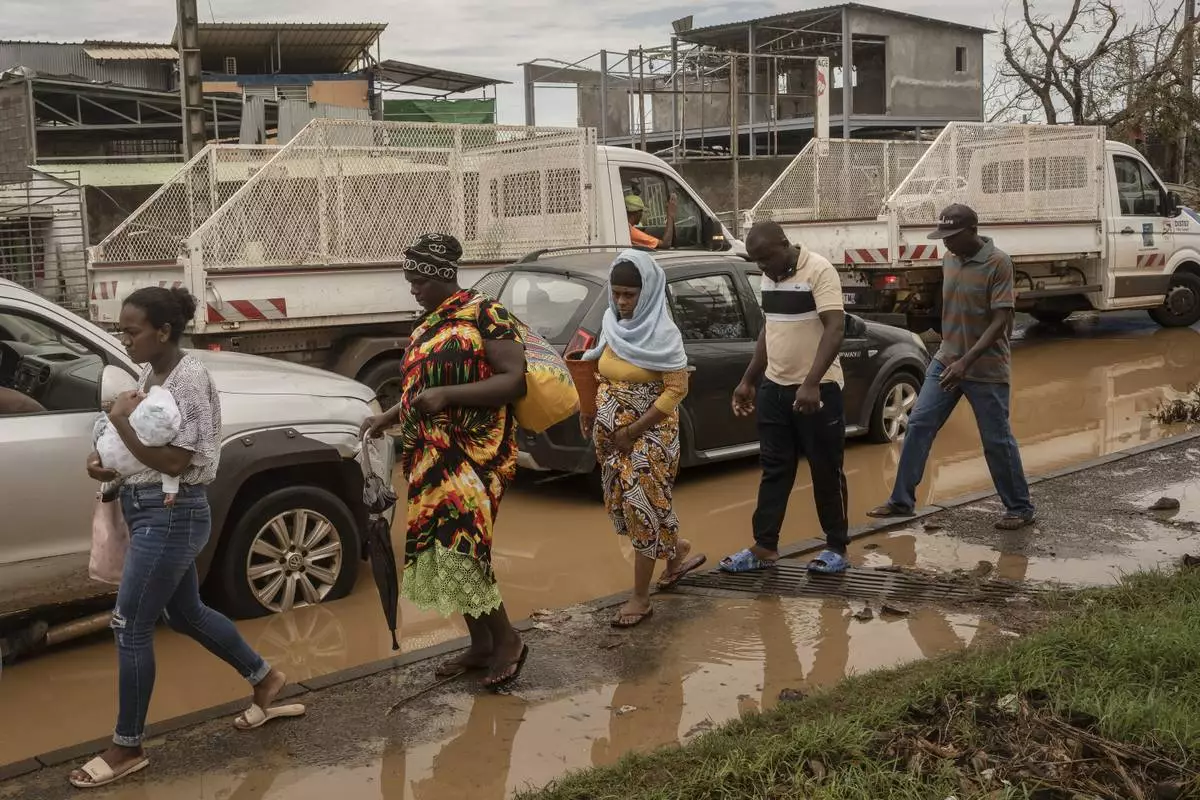
People walk along partially flooded roads, in Mamoudzou, Mayotte, Thursday, Dec. 19, 2024. (AP Photo/Adrienne Surprenant)
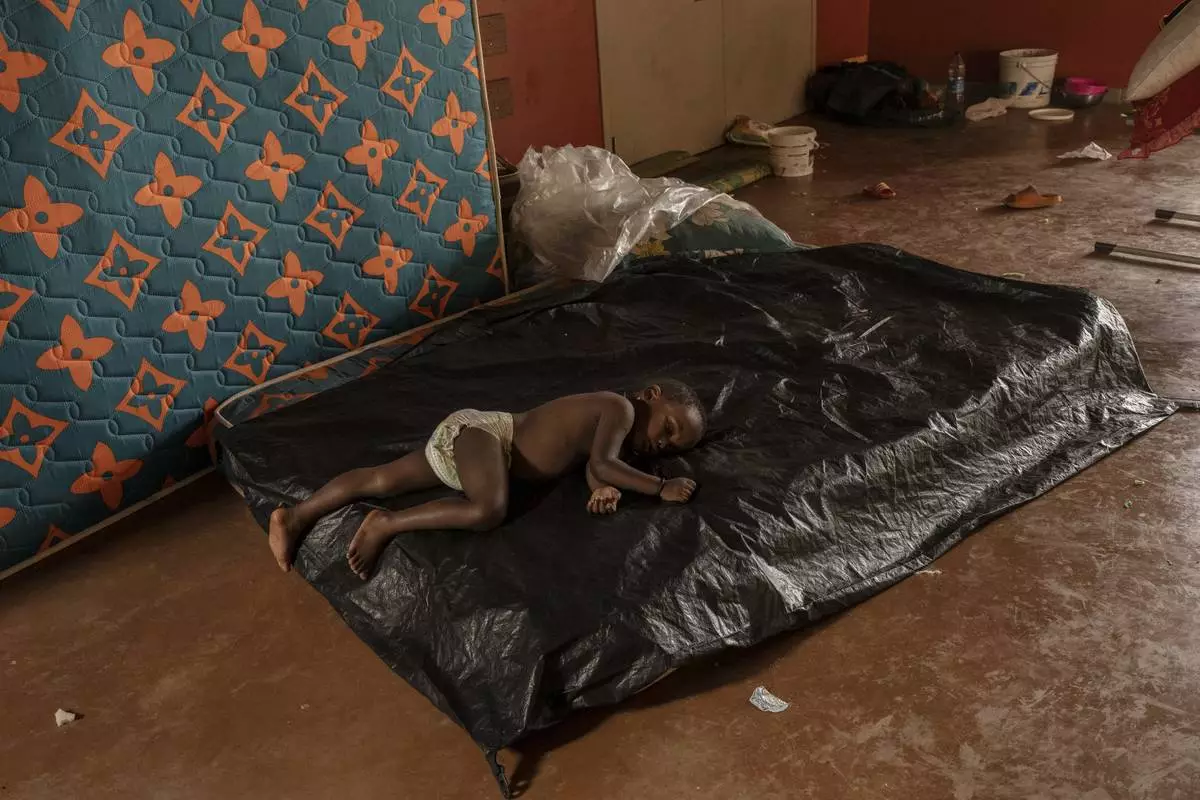
A child sleeps at the Lycée des Lumières where he found refuge, Thursday, Dec. 19, 2024 in Mamoudzou, Mayotte, (AP Photo/Adrienne Surprenant)
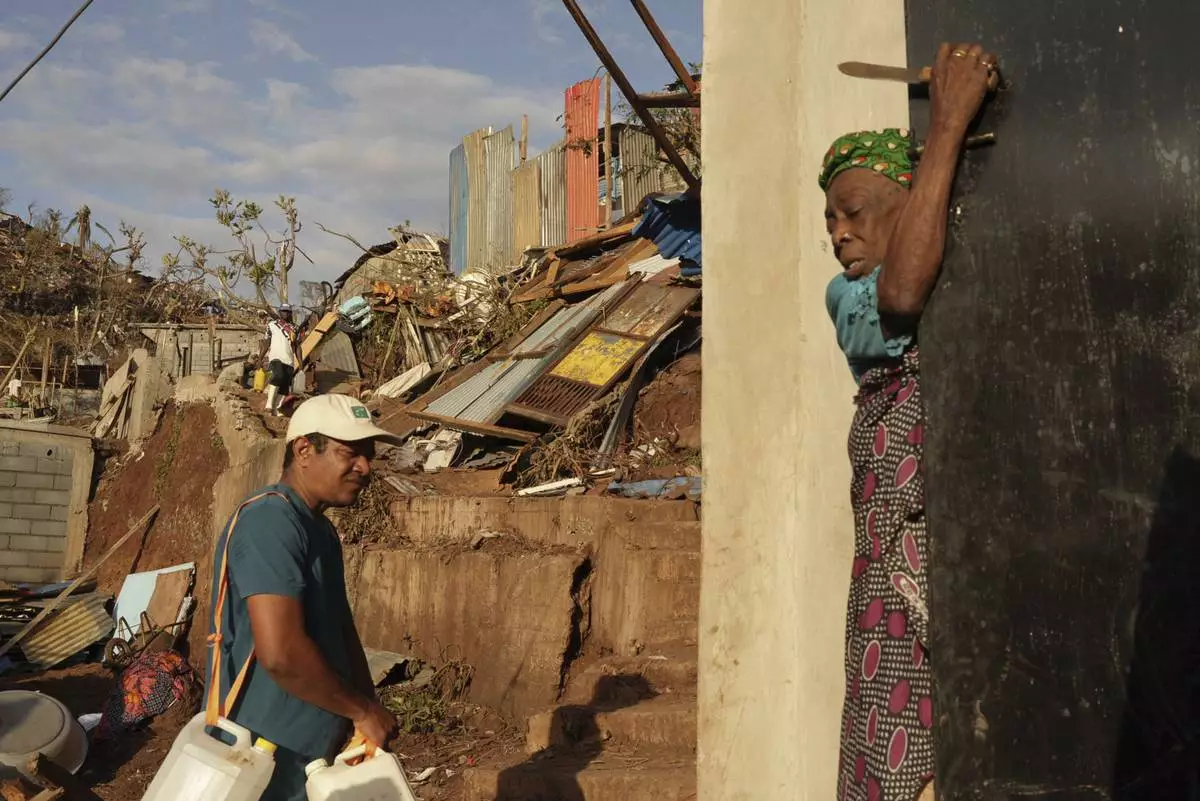
People walk past debris in the Kaweni slum Thursday, Dec. 19, 2024, on the outskirts of Mamoudzou, in the French Indian Ocean island of Mayotte, after Cyclone Chido. (AP Photo/Adrienne Surprenant)
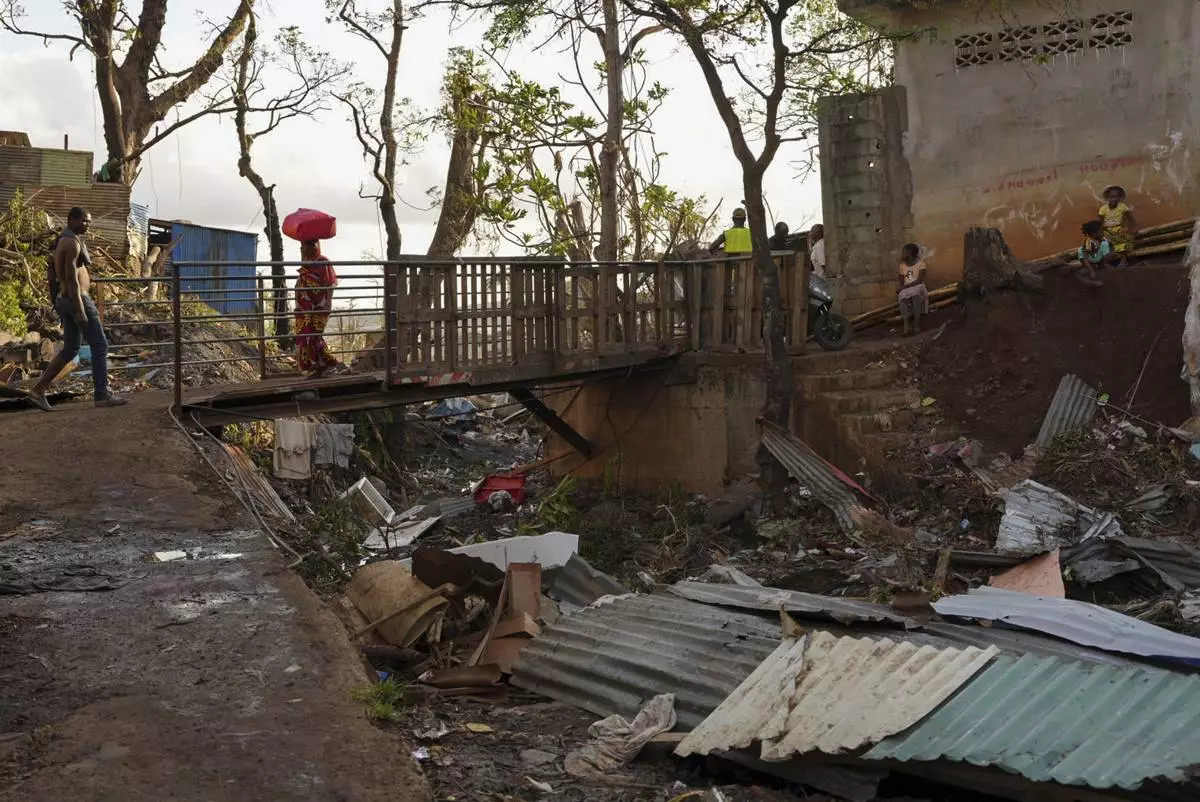
People walk past debris in the Kaweni slum Thursday, Dec. 19, 2024, on the outskirts of Mamoudzou, in the French Indian Ocean island of Mayotte, after Cyclone Chido. (AP Photo/Adrienne Surprenant)
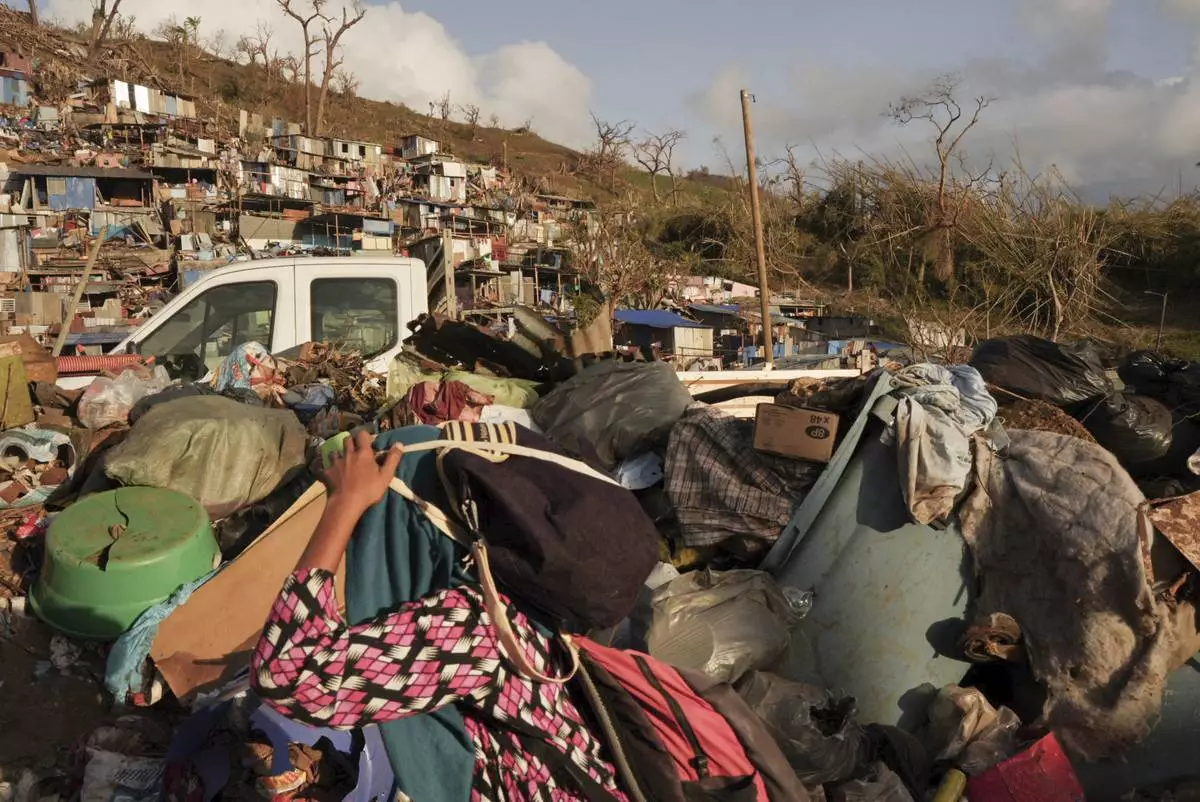
A woman carrying her belongings walks past debris after Cyclone Chido in the Kaweni slum Thursday, Dec. 19, 2024, on the outskirts of Mamoudzou, in the French Indian Ocean island of Mayotte. (AP Photo/Adrienne Surprenant)
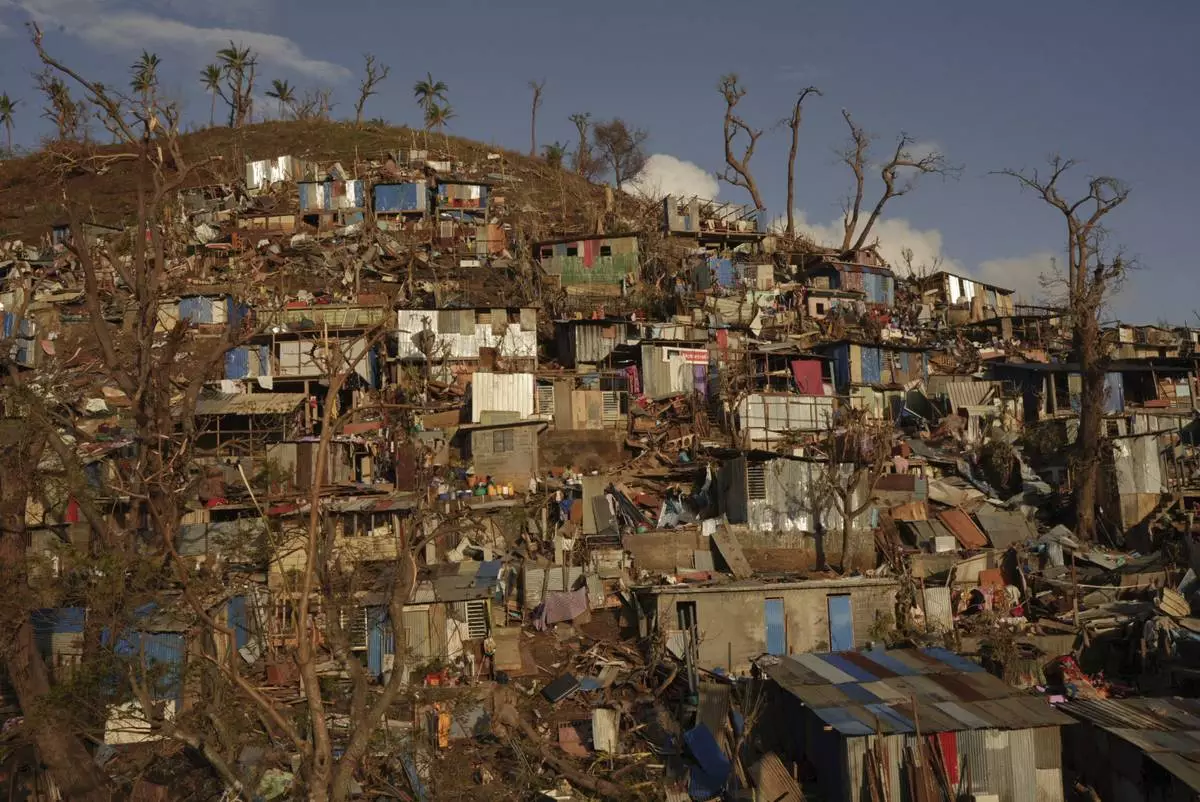
Damage is seen in the Kaweni slum Thursday, Dec. 19, 2024, on the outskirts of Mamoudzou, in the French Indian Ocean island of Mayotte, after Cyclone Chido. (AP Photo/Adrienne Surprenant)
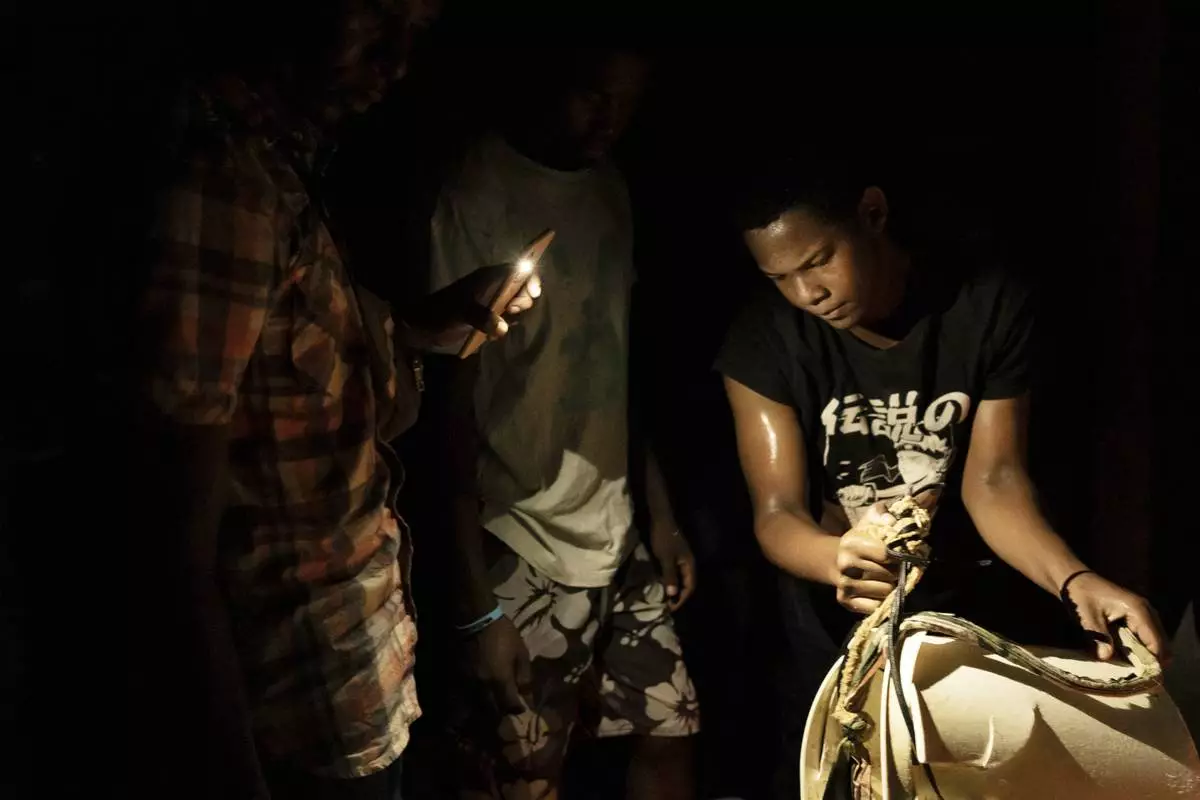
People get water from a well in the lower part of the Kaweni slum where they used to have tap water, on the outskirts of Mamoudzou, in the French Indian Ocean island of Mayotte Thursday, Dec. 19, 2024, after Cyclone Chido. (AP Photo/Adrienne Surprenant)
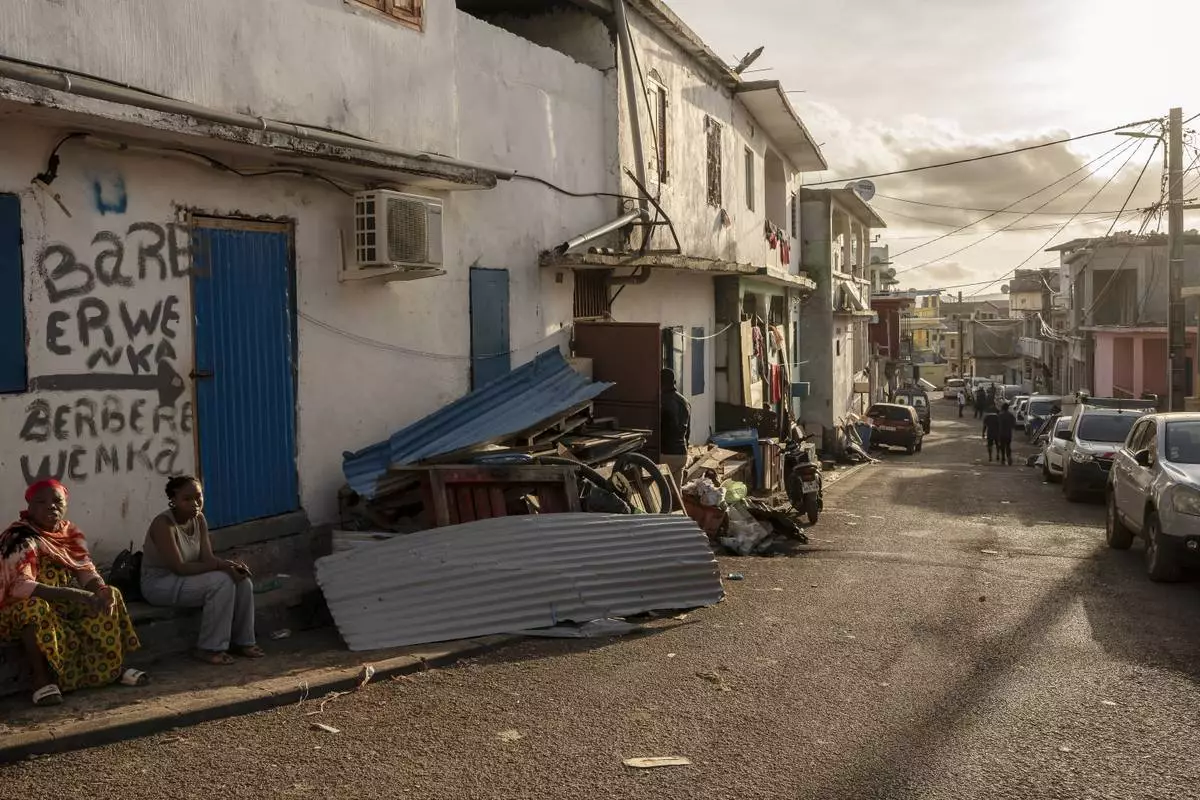
Cleared debris after Cyclone Chido are seen in the Kaweni slum on the outskirts of Mamoudzou, in the French Indian Ocean island of Mayotte, Thursday, Dec. 19, 2024. (AP Photo/Adrienne Surprenant)
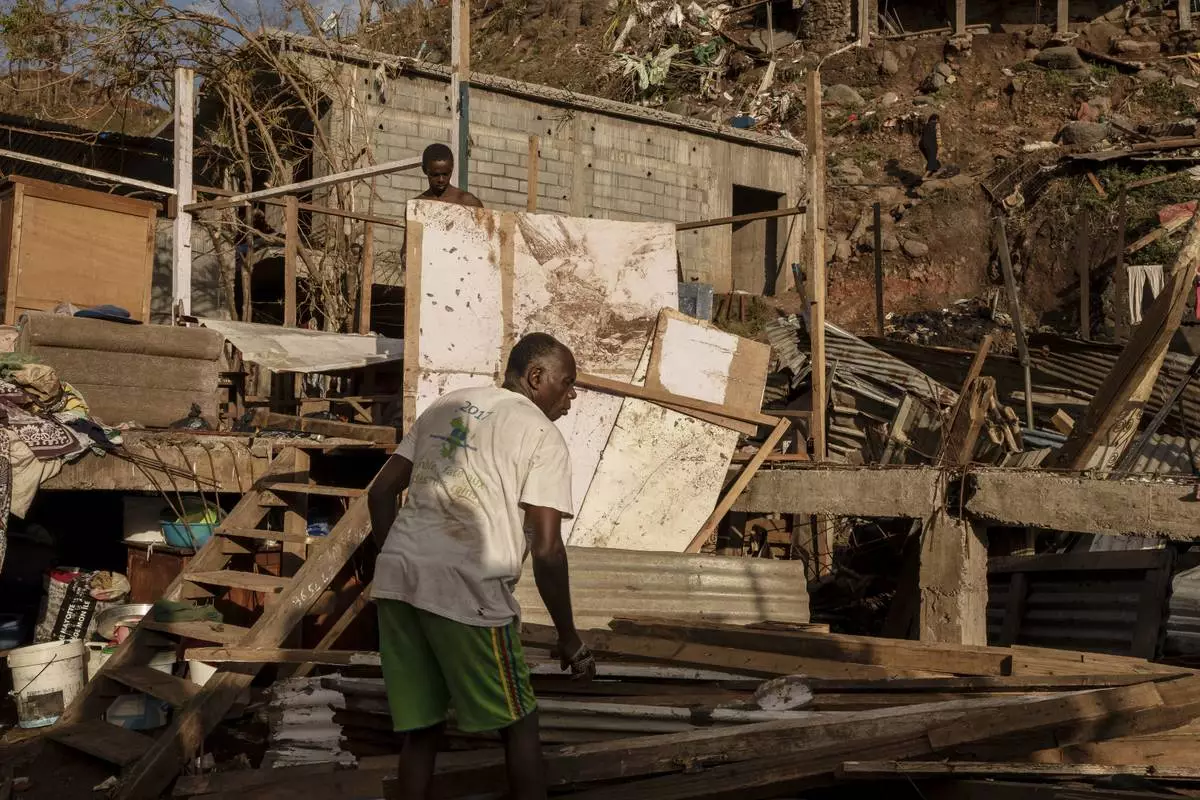
A man starts rebuilding his shack in the Kaweni slum on the outskirts of Mamoudzou, in the French Indian Ocean island of Mayotte, Thursday, Dec. 19, 2024, after Cyclone Chido. (AP Photo/Adrienne Surprenant)
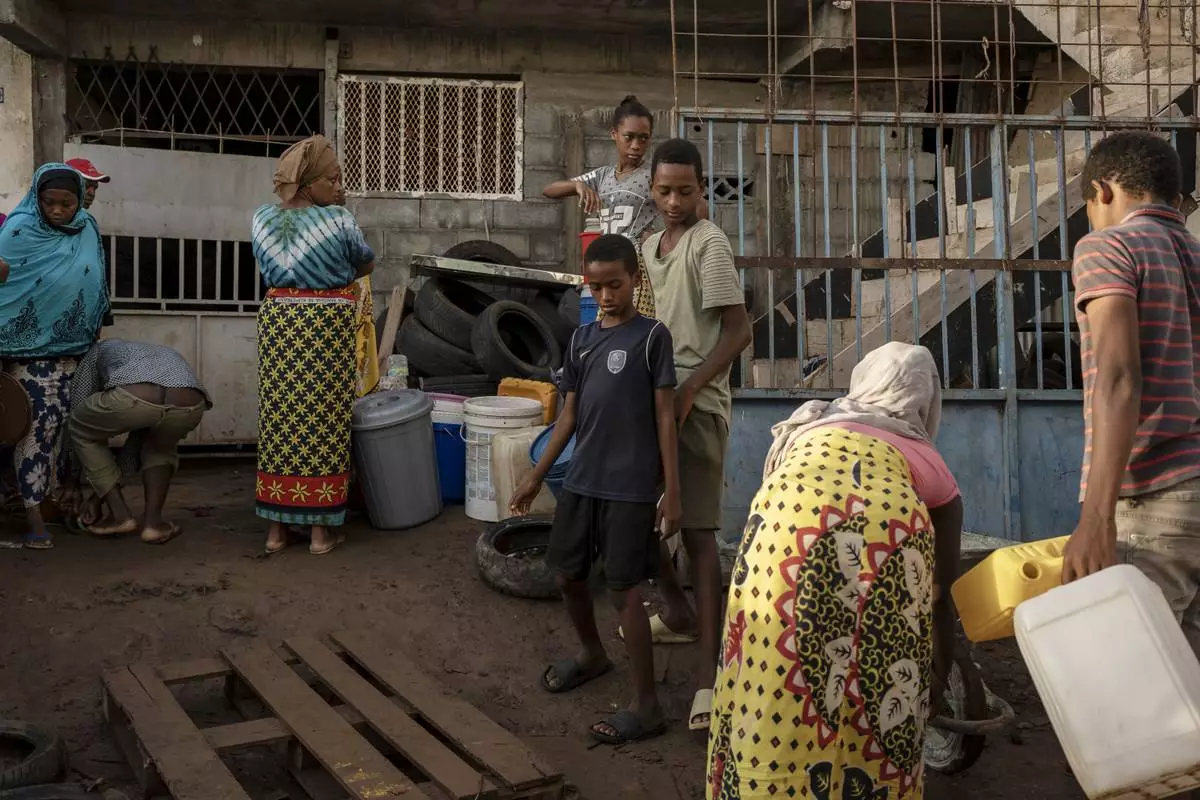
People get water from a well in the lower part of the Kaweni slum where they used to have tap water, on the outskirts of Mamoudzou, in the French Indian Ocean island of Mayotte Thursday, Dec. 19, 2024, after Cyclone Chido. (AP Photo/Adrienne Surprenant)
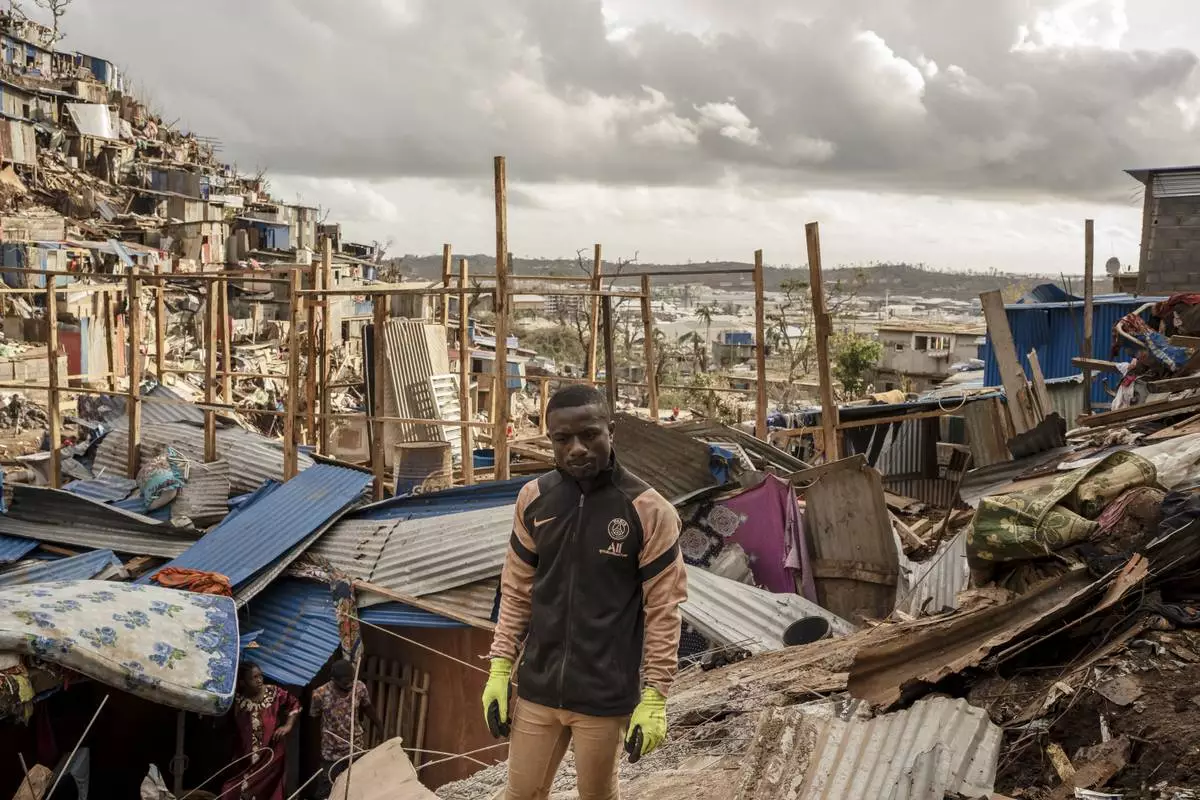
Nassirou Hamidouni, 28, father of five, stands amongst the debris of the neighboring destroyed home in the slum of Kaweni on the outskirts of Mamoudzou, in the French Indian Ocean island of Mayotte Thursday, Dec. 19, 2024, after Cyclone Chido. (AP Photo/Adrienne Surprenant)
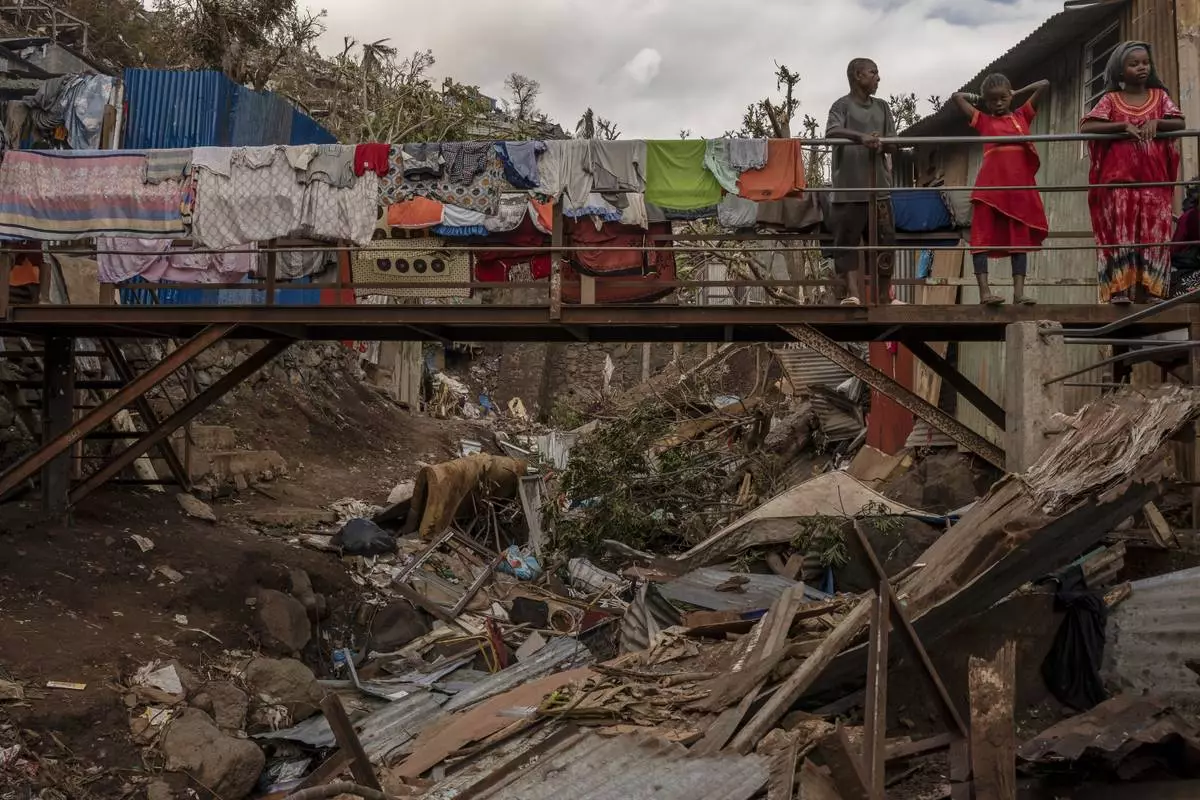
Debris litters a stream in the Kaweni slum in the French Indian Ocean island of Mayotte, Thursday, Dec. 19, 2024, after Cyclone Chido.. (AP Photo/Adrienne Surprenant))
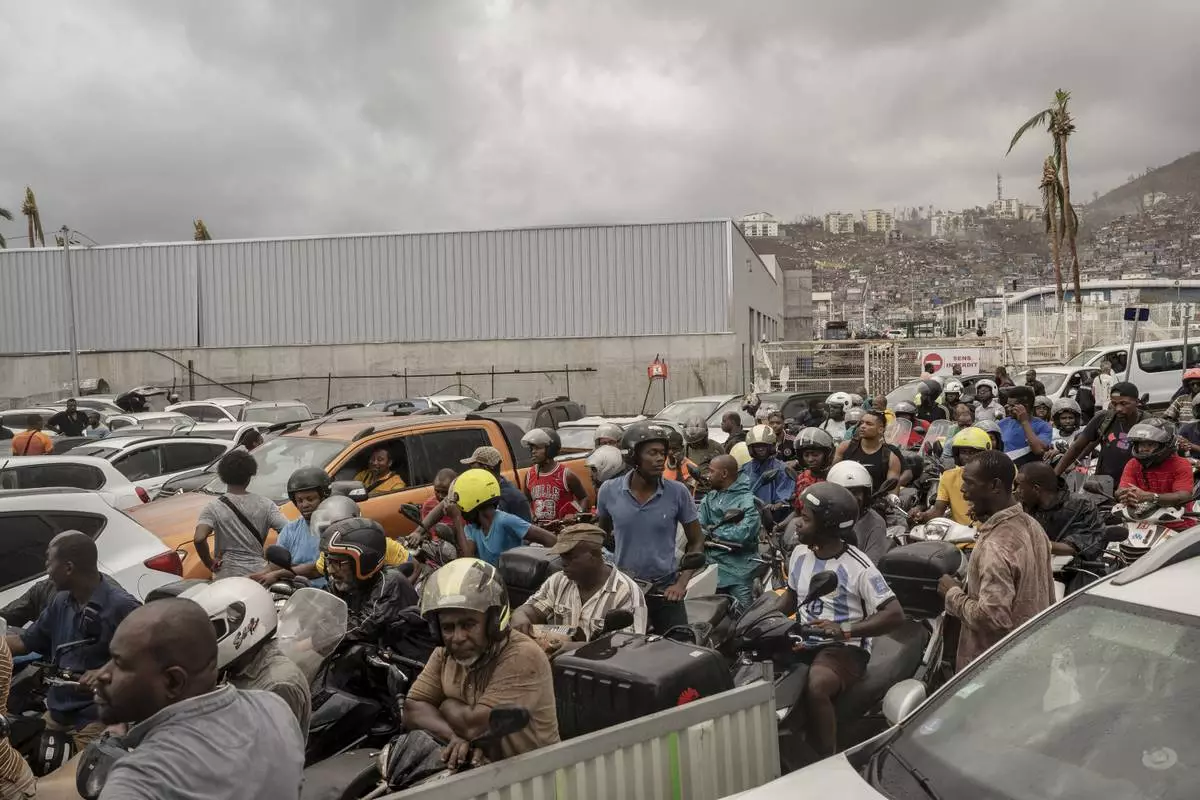
People queue for gas in Mamoudzou, in the French Indian Ocean island of Mayotte, Thursday, Dec. 19, 2024, after Cyclone Chido. (AP Photo/Adrienne Surprenant)
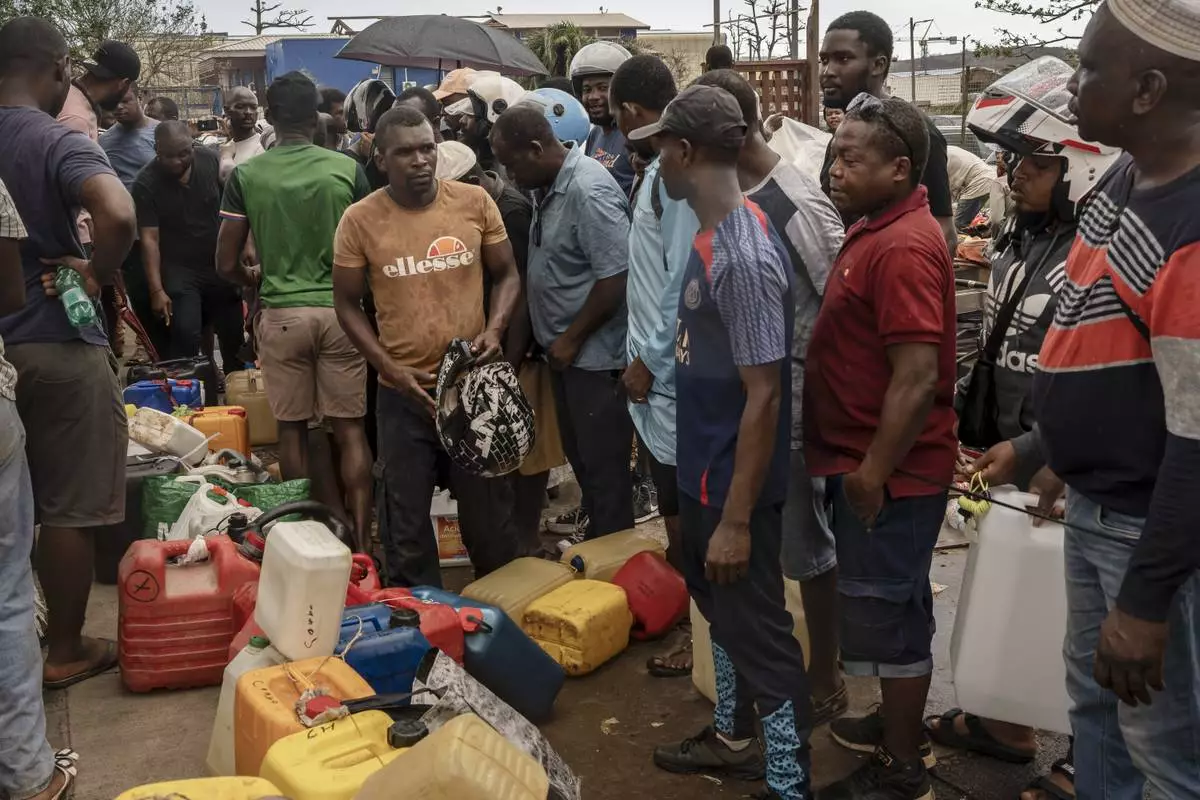
People queue for gas in Mamoudzou, in the French Indian Ocean island of Mayotte, Thursday, Dec. 19, 2024, after Cyclone Chido. (AP Photo/Adrienne Surprenant)
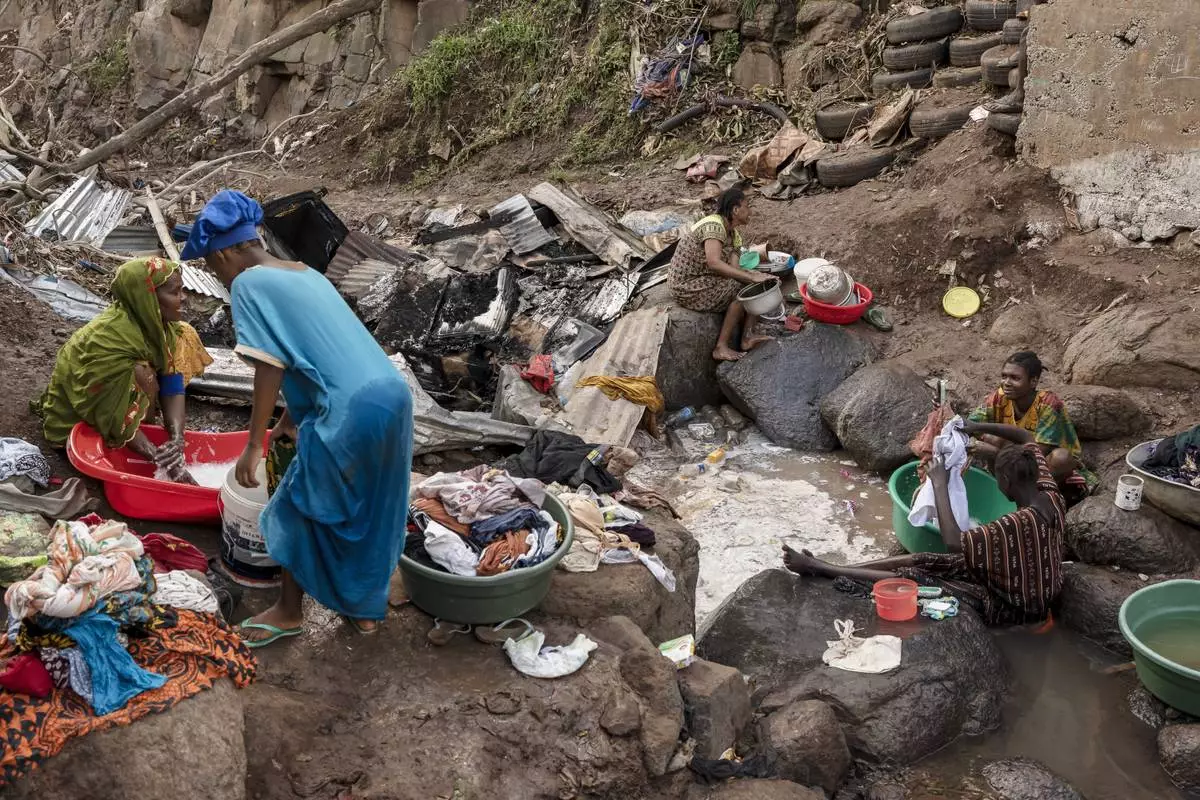
Women wash clothes in a stream in the Kaweni slum on the outskirts of Mamoudzou in the French Indian Ocean island of Mayotte, Thursday, Dec. 19, 2024, after Cyclone Chido. (AP Photo/Adrienne Surprenant)
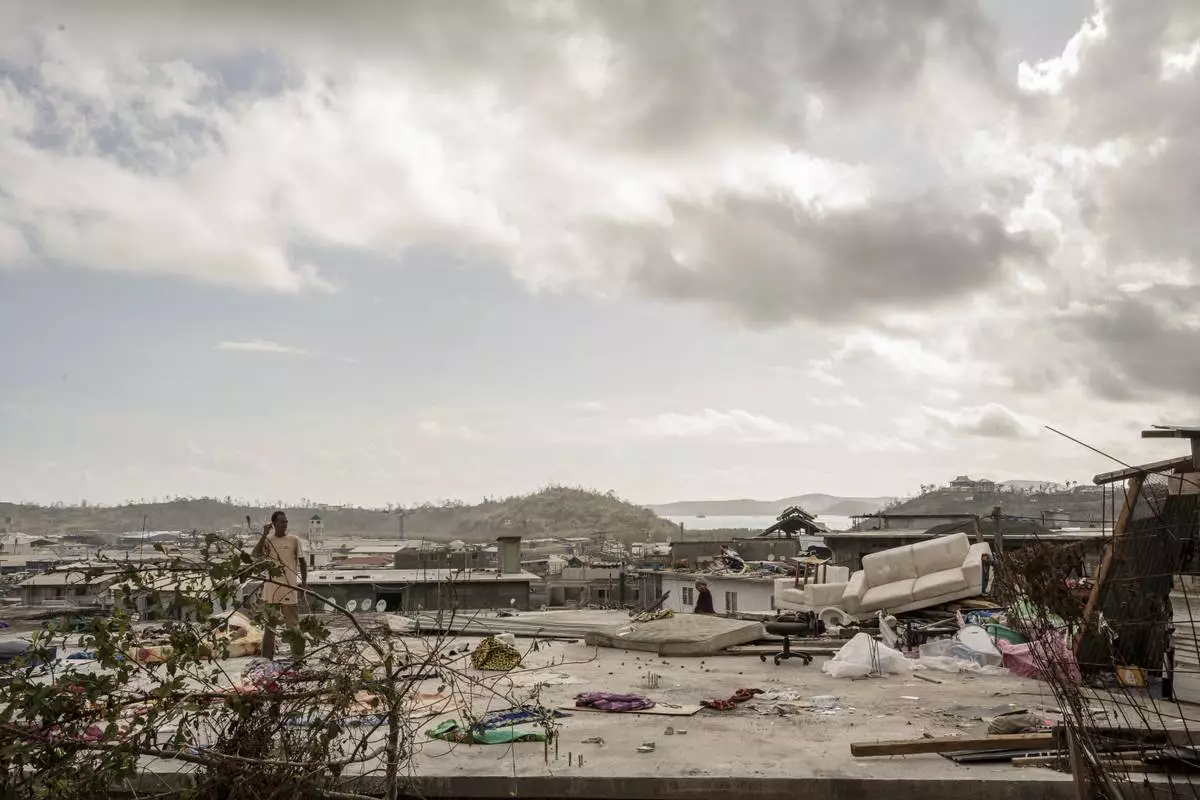
A man stands on his roof in the Kaweni slum on the outskirts of Mamoudzou in the French Indian Ocean island of Mayotte, Thursday, Dec. 19, 2024, after Cyclone Chido. (AP Photo/Adrienne Surprenant)
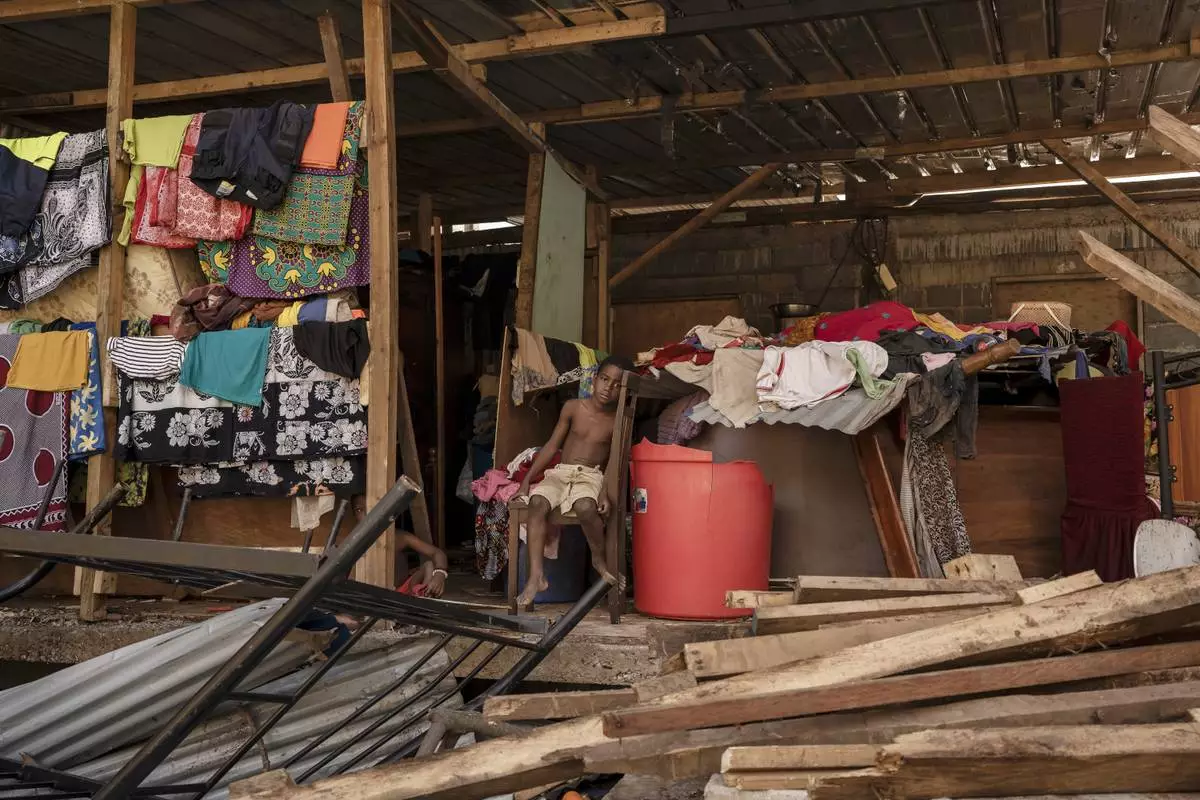
A boy sits in his destroyed home in the Kaweni slum on the outskirts of Mamoudzou in the French Indian Ocean island of Mayotte, Thursday, Dec. 19, 2024, after Cyclone Chido. (AP Photo/Adrienne Surprenant)
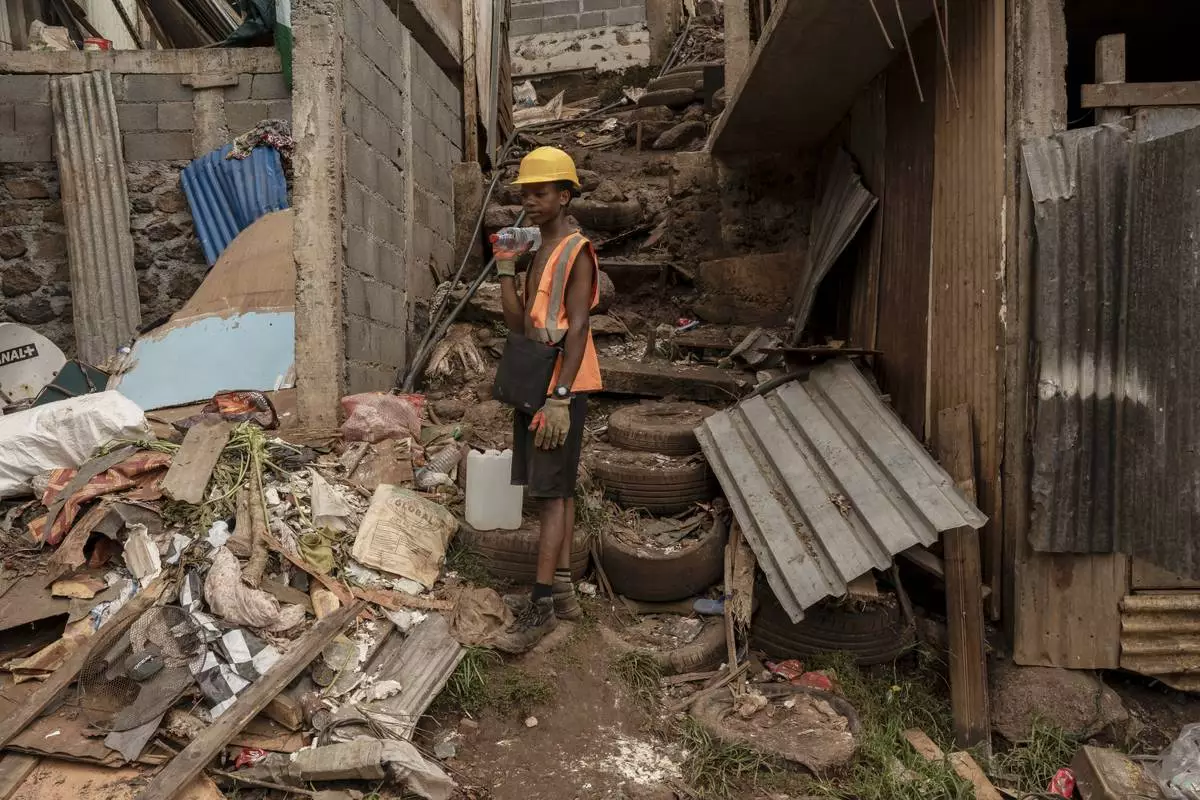
A boy stands amidst debris in the Kaweni slum on the outskirts of Mamoudzou in the French Indian Ocean island of Mayotte, Thursday, Dec. 19, 2024, after Cyclone Chido. (AP Photo/Adrienne Surprenant)
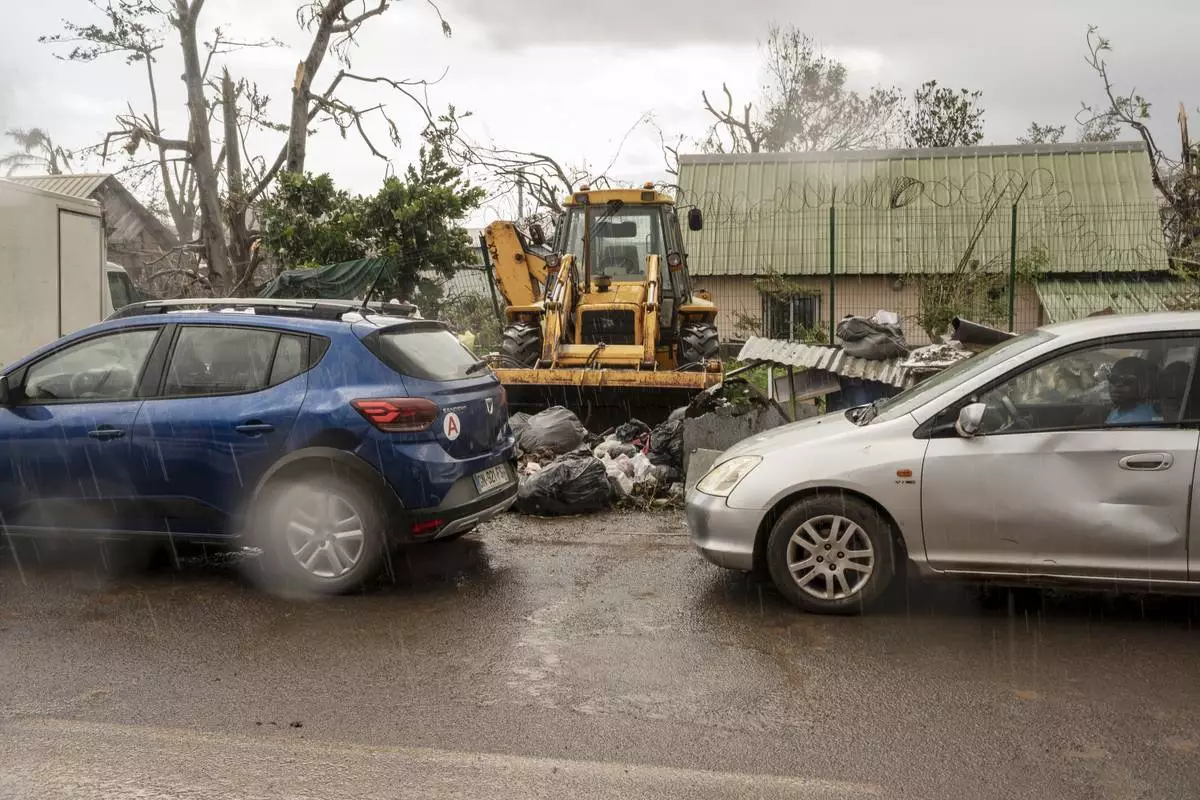
People queue for gas in Mamoudzou in the French Indian Ocean island of Mayotte, Thursday, Dec. 19, 2024, after Cyclone Chido. (AP Photo/Adrienne Surprenant)
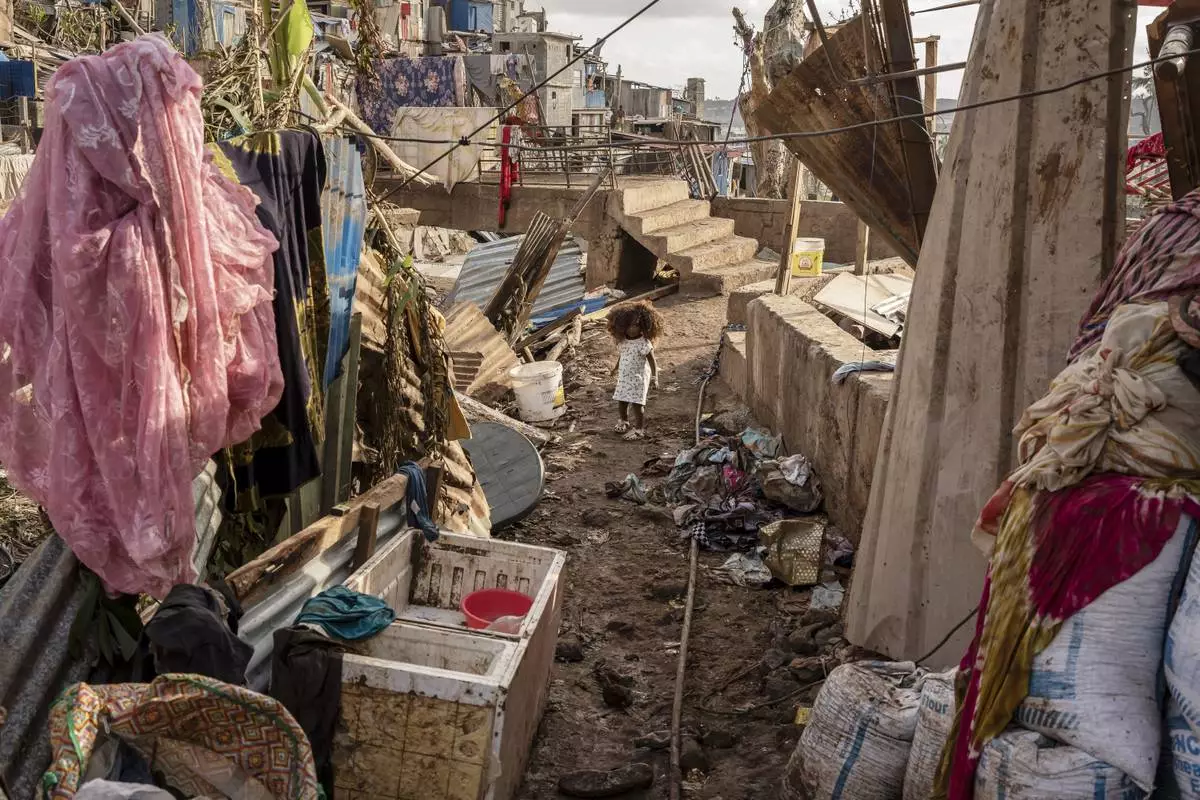
A young girl walks in the Kaweni slum on the outskirts of Mamoudzou, in the French Indian Ocean island of Mayotte, Thursday, Dec. 19, 2024, after Cyclone Chido. (AP Photo/Adrienne Surprenant)
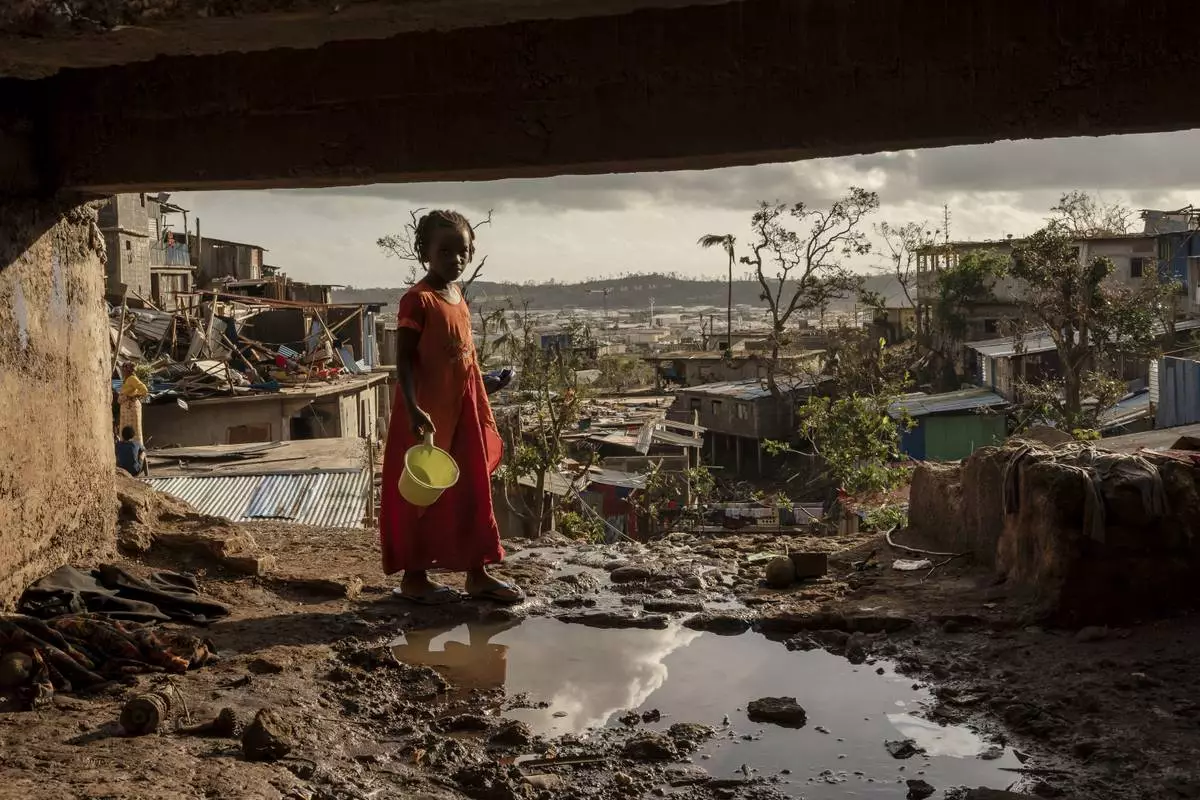
A young girl walks in the Kaweni slum on the outskirts of Mamoudzou, in the French Indian Ocean island of Mayotte, Thursday, Dec. 19, 2024, after Cyclone Chido. (AP Photo/Adrienne Surprenant)
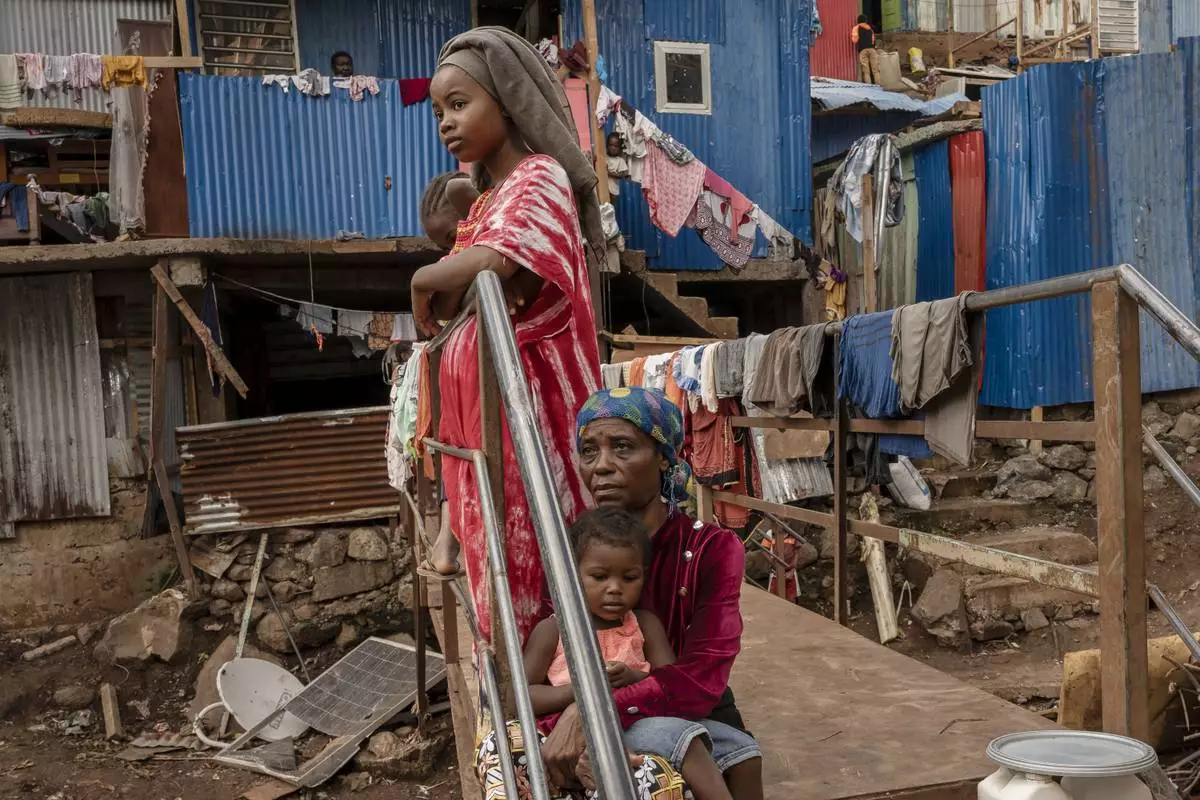
Women rest on a footbridge over a stream filled with debris in the Kaweni slum in the French Indian Ocean island of Mayotte, Thursday, Dec. 19, 2024, after Cyclone Chido. (AP Photo/Adrienne Surprenant)


































